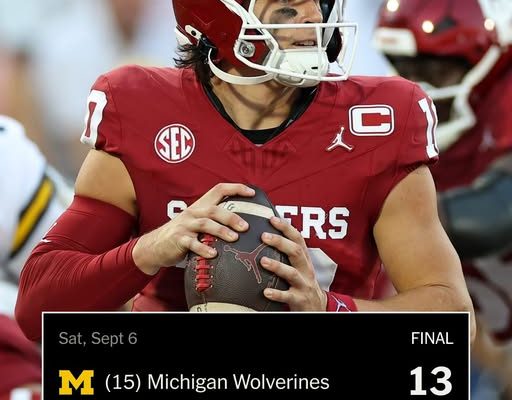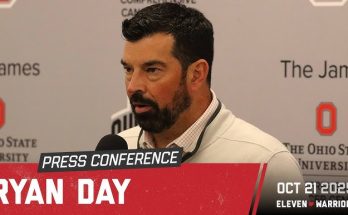When two proud football programs like Oklahoma and Michigan meet on the field, it is never just another game on the schedule. The history, tradition, and weight of expectation that follows both of these institutions means that each contest carries an aura of significance, even more so when both programs are trying to reestablish themselves after seasons that fell short of expectations. On Saturday, that backdrop was the stage for a gritty, defensive-minded battle between the No. 18 Oklahoma Sooners and the No. 15 Michigan Wolverines. In the end, Oklahoma emerged with a crucial early-season victory, defeating Michigan 24-13 and sending a message that they may be ready to write a different narrative in 2025 after a frustrating 2024 campaign.
For Oklahoma, the win was about more than just a number in the standings. It was about proving that the culture head coach Brent Venables has been working to establish is beginning to take hold in a meaningful way. Last season was supposed to be a leap forward for the Sooners, but it ended in disappointment, with inconsistency, injuries, and a lack of execution in critical moments. Questions swirled about whether the program had lost its identity, especially with the impending move to the SEC. Saturday’s performance was the kind of game that can start to answer those questions. By outlasting a tough, physical Michigan squad, Oklahoma demonstrated resilience, balance, and a sharper edge than they showed at key points last season.
The Sooners started fast, setting the tone early with an opening drive that ended in the end zone. Quarterback Jackson Arnold looked poised, distributing the ball effectively and avoiding costly mistakes against a Michigan defense known for its physical front. Arnold, who endured his share of growing pains last year, appeared more mature and comfortable in his role. He wasn’t asked to do too much, but when opportunities arose, he delivered key throws that kept drives alive. His connection with wide receiver Nic Anderson proved vital, as Anderson’s route running and ability to win contested catches helped Oklahoma sustain momentum during stretches when Michigan’s defense threatened to seize control.
Oklahoma’s running game also played a pivotal role in the outcome. While the Wolverines have long prided themselves on dominating the line of scrimmage, it was the Sooners who managed to impose their will for much of the contest. Jovantae Barnes and Gavin Sawchuk split carries effectively, pounding away at Michigan’s defense and keeping the chains moving. The Sooners’ offensive line, often criticized last season for inconsistency, held up admirably against one of the nation’s more physical defensive fronts. By controlling the pace and dictating tempo, Oklahoma forced Michigan to play from behind, which disrupted the Wolverines’ preferred style of football.
Defensively, Oklahoma made perhaps its strongest statement of the night. Venables has always been known as a defensive-minded coach, and Saturday was a showcase for his ability to scheme and prepare his unit. The Sooners swarmed to the football, limiting Michigan’s vaunted rushing attack and refusing to allow explosive plays that could swing momentum. Michigan quarterback J.J. McCarthy found himself under pressure throughout the night, never quite settling into a rhythm. While Michigan had some success moving the ball between the 20s, Oklahoma’s defense stiffened in the red zone, forcing the Wolverines to settle for field goals rather than touchdowns. That bend-but-don’t-break mentality proved decisive, as the Sooners consistently kept the game within their grasp.
Michigan, for its part, entered the season with its own set of questions. Coming off a year in which they failed to meet sky-high expectations, the Wolverines faced pressure to reassert themselves as a national contender. Saturday’s loss will sting, not only because it was a matchup against another tradition-rich program but also because it revealed some lingering issues that haunted them last year. Offensively, Michigan never looked fully comfortable. Their ground game, typically their bread and butter, was neutralized by Oklahoma’s disciplined front seven. Without consistent success on the ground, too much responsibility fell on McCarthy, who struggled against disguised coverages and timely blitzes.
Defensively, Michigan was solid but not dominant. They managed to keep the game within reach for much of the night, but they failed to generate the turnovers or game-changing plays that could have swung momentum in their favor. Against an Oklahoma team that was determined not to beat itself, the Wolverines’ defense needed to create chaos, and it simply didn’t happen. A couple of missed tackles and a costly penalty extended Oklahoma drives at critical junctures, and those small lapses added up over the course of the game.
The turning point came in the second half. Michigan had trimmed Oklahoma’s lead to 17-13 and appeared poised to seize momentum. But the Sooners responded with their most impressive drive of the game, marching down the field with a blend of short passes and power runs before Arnold capped it off with a touchdown strike to Anderson. That score reestablished a two-possession lead and quieted any notion that Michigan was about to complete a comeback. From that moment on, Oklahoma’s defense tightened its grip, smothering Michigan’s offense and closing the game out with authority.
For both fan bases, the game carried symbolic weight. Oklahoma fans have long prided themselves on their program’s ability to rise to the occasion in big games, and Saturday felt like a return to that tradition. The Sooners’ performance wasn’t flashy, but it was disciplined, balanced, and tough—traits that Venables has been emphasizing since his arrival. For Michigan fans, the loss was a sobering reminder that the climb back to the top will not be easy. The Wolverines are still a talented team, but their flaws remain visible, and until they prove they can win games like this against top-tier opponents, doubts will linger.
From a broader perspective, the result also carries implications for the national landscape. Early-season matchups between ranked teams often serve as barometers for where programs stand, and Oklahoma’s victory positions them as a team to watch moving forward. They have the talent and coaching to be a factor in the playoff discussion, especially if this win becomes a springboard for continued improvement. For Michigan, the loss doesn’t end their hopes, but it does put pressure on them to respond quickly. In the unforgiving world of college football, where every loss is magnified, the Wolverines cannot afford to let this setback snowball into a trend.
One of the most encouraging signs for Oklahoma was their composure in high-leverage situations. Last season, the Sooners often faltered late in games, either through turnovers, blown assignments, or mental mistakes. Against Michigan, however, they were the team that executed better when it mattered most. Third-down conversions, red-zone efficiency, and situational awareness all tilted in Oklahoma’s favor, and those are the kinds of details that separate good teams from great ones. Venables has spoken often about the importance of discipline and execution, and Saturday’s win was a tangible example of progress in those areas.
As the season progresses, both programs will face defining moments that test their growth. For Oklahoma, the challenge will be consistency. It is one thing to rise up for a marquee non-conference opponent; it is another to bring that same level of focus and intensity week after week. If the Sooners can maintain this standard, they could very well become a dark horse contender in the playoff race. For Michigan, the task is to regroup, address the shortcomings exposed in this game, and ensure that one loss does not derail their season. With the talent on their roster and the pride of their tradition, the Wolverines still have the tools to rebound, but they will need to sharpen their execution and rediscover their offensive identity.
The Oklahoma-Michigan showdown served as a reminder of why college football captivates so many fans. It was a contest filled with history, passion, and high stakes, where every snap felt meaningful. The Sooners walked away with a crucial win and renewed optimism, while the Wolverines left with hard questions and a renewed sense of urgency. For both programs, the road ahead remains challenging, but Saturday’s result may prove to be a pivotal moment in defining the trajectory of their seasons.
In the end, Oklahoma’s 24-13 victory over Michigan was not just an early-season win; it was a statement. A statement that the Sooners are ready to fight their way back into the national spotlight, and that the foundation Venables has been building is beginning to bear fruit. For Michigan, it was a reminder that potential alone is not enough—they will need to execute at a higher level if they hope to rejoin the ranks of college football’s elite. And for the rest of the nation, it was another example of why these early-season showdowns between blueblood programs remain some of the most compelling theater in sports.

